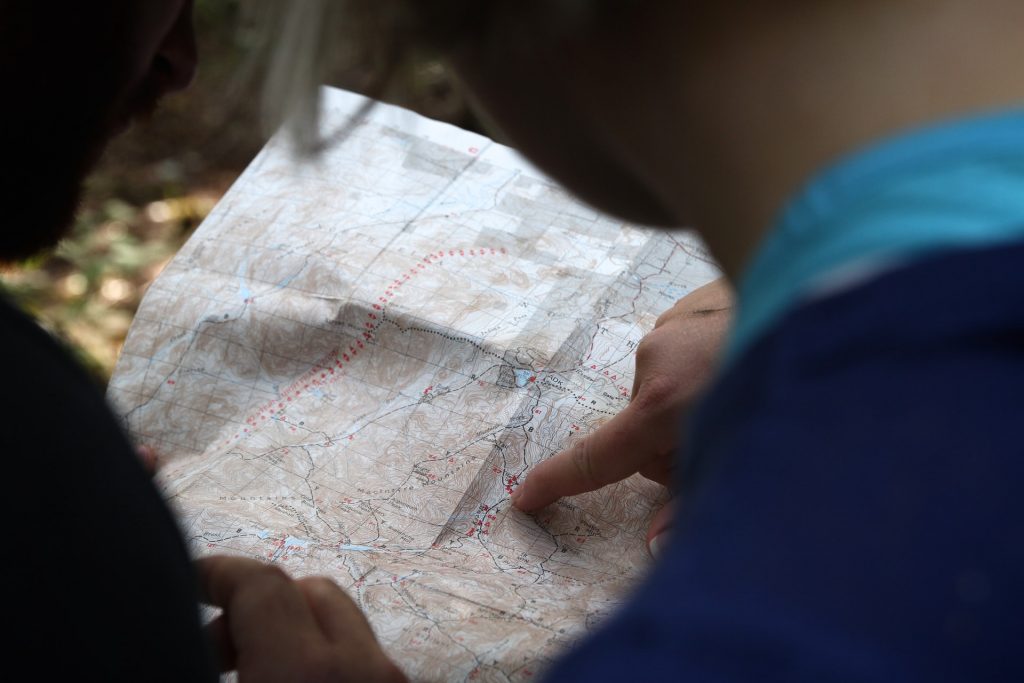What is Map Memory?
Map memory, as defined for use in rogaining and orienteering, is the ability to look at a map and commit the relevant portion of the map to memory, it is said that this is useful for finding the next control without having to continually refer to the physical map. This is important because it is often hard to look at a map when going through difficult terrain without stopping, and every time you stop you lose points.

I am constantly bemused by teams, often quite fast ones, who stop at every control to plot their route to the next one. This is bad practice for a couple of reasons. Firstly, every time you stop you lose points (or the potential to get more points anyway). Secondly, the very worst place to plan your route is standing next to a control and letting everyone in close proximity know where to look.
If I can’t find a control, but other people are nearby I look at them and ask myself: “Are they stopping because they’ve found the control or are they stopping because they don’t know where they are?”. If a team is moving I ask myself “are they moving like a team on a mission for the next control or do they look as though they are looking for something?” I have probably found hundreds of controls over the years simply by assessing the body language and route taken by my fellow competitors.
Needless to say, when I punch a control I walk on in the direction of the next control. If additional route planning or discussion is needed then this happens well away from the control.
Young people
This article (Thanks to Tristan for bringing it to my attention) talks about young people not developing the part of the brain used for mapping. I think this is probably true, but does not significantly impact rogaining ability.
I have done some walking in the west of Papua and New Guinea and the villagers had a very well developed mental map of their area, but had never actually seen a map. They did not even recognise the area when I showed them a map and I remember a few frustrating conversations trying to match my interpretation of the paper map to their very detailed mental map.
My son, now 20, orienteers with me occasionally and I have been impressed with how quickly he has developed the skill of translating map to ground. This is surprising because he totally relies on his GPS to get around when driving and he cannot even name all the suburbs that surround us, in the only suburb he has ever lived.

My Own Journey
My own experience is in stark contrast with children of today who have never had to remember a map. At the age of 17 and having just finished my HSC I filled the gap between the HSC and Uni by working as a courier delivering letters and parcels around Sydney. In those days (1980-81) there was no GPS, so a courier’s ability to make money was pretty dependent upon their ability to remember the suburbs and streets around Sydney. I was always impressed by the old hands who literally knew every street and lane between the Airport and Artarmon to the north and probably as far west as Leichhardt. For my own part, my ability to make money (and it was good money for a 17y.o.) was dependent on my ability to look at a street directory (if you know what that is :>) and remember a route across two or three pages and then execute that route in the car.
You would expect that this experience and skill would make have me a natural when it came to rogaining or orienteering, but it didn’t. I think this is because map memory is much more a learnt skill of decoding the map rather than remembering it.
An example
Click on this link below, which will open a new window with a map. Your job is to get from control 80 to control 60 as quickly as possible only looking at the map once.
https://nswrogaining.org/AboutEvents/Events/21PP/map_memory_map_segment.jpg
Once you have had a look at the map and come back and read on.
Even if you have a poor memory I am betting that you can still remember:
- In which direction do I need to go?
- How far do I need to go in that direction?
- Are there any hand rails (guiding features) to help me get there?
- Will I be walking uphill or downhill or both?
- Are there any catching features so I will know if I have gone too far?
- What will my horizon look like at major points on the track?
- Will I cross any creeks and in which direction will they be going?
- Will I cross any ridges or tracks and in which direction will they be going?
I think map memory, in connection with rogaining and orienteering, is a bit of a myth. I do not need to remember the map. The skill is to decode the map into a set of instructions that you can remember on your way to the next control. I suspect that what makes the difference between a good and bad rogainer is knowing what questions to ask when looking at the map and remembering the answers as fatigue sets in.
Conclusion
I remember a few years ago my son and I, while on a Lord of the Rings tour around New Zealand, decided we would try and remember the sequence of cards in a shuffled deck after one viewing. To me this sounded like a very difficult and slightly impressive thing to do, but having learned the techniques and after a couple of days practice we could both remember a deck of cards (my son was better at it than me, but don’t tell him). With a bit of practice I could probably perform this feat again, but I do not think that I can remember a map snippet sufficiently well to use it for guidance mid event.
The skill is in decoding the map using a set of questions and then remembering the answers to those questions. You do not need to be able to use your visual memory to remember the map. Perhaps some people do rogaine this way, but I suspect that they are the minority.
If you are a young person and have read the linked article and are worried about your “parahippocampal gyrus” shrinking, I wouldn’t worry too much. I am sure there was once a part of our brains dedicated to running away from wild animals but I suspect I won’t be using that part of my brain anytime soon and my son will just keep using his GPS.
P.S. If you are still worried about your parahippocampal gyrus shrinking and falling out your ear then here are some orienterring based map memory games:
https://betterorienteering.org/games/
https://public.tableau.com/app/profile/dan.chissick/viz/MemoryGame_15741092815080/Memory